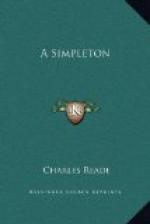Six hours the storm raged, and, before it ended, he had recovered nearly his whole past, except his voyage with Captain Dodd—that, indeed, he never recovered—and the things that happened to him in the hospital before he met Phoebe Falcon and her brother: and as soon as he had recovered his lost memory, his body began to shiver at the hail and rain. He tried to find his way home, but missed it; not so much, however, but that he recovered it as soon as it began to clear, and just as they were coming out to look for him, he appeared before them, dripping, shivering, very pale and worn, with the handkerchief still about his head.
At sight of him, Dick slipped back to his sister, and said, rather roughly, “There now, you may leave off crying: he is come home; and to-morrow I take him to Cape Town.”
Christopher crept in, a dismal, sinister figure.
“Oh, sir,” said Phoebe, “was this a day for a Christian to be out in? How could you go and frighten us so?”
“Forgive me, madam,” said Christopher humbly; “I was not myself.”
“The best thing you can do now is to go to bed, and let us send you up something warm.”
“You are very good,” said Christopher, and retired with the air of one too full of great amazing thoughts to gossip.
He slept thirty hours at a stretch, and then, awaking in the dead of night, he saw the past even more clear and vivid; he lighted his candle and began to grope in the Cape Gazette. As to dates, he now remembered when he had sailed from England, and also from Madeira. Following up this clew, he found in the Gazette a notice that H. M. ship Amphitrite had been spoken off the Cape, and had reported the melancholy loss of a promising physician and man of science, Dr. Staines.
The account said every exertion had been made to save him, but in vain.
Staines ground his teeth with rage at this. “Every exertion! the false-hearted curs. They left me to drown, without one manly effort to save me. Curse them, and curse all the world.”
Pursuing his researches rapidly, he found a much longer account of a raft picked up by Captain Dodd, with a white man on it and a dead body, the white man having on him a considerable sum in money and jewels.
Then a new anxiety chilled him. There was not a word to identify him with Dr. Staines. The idea had never occurred to the editor of the Cape Gazette. Still less would it occur to any one in England. At this moment his wife must be mourning for him. “Poor—poor Rosa!”
But perhaps the fatal news might not have reached her.
That hope was dashed away as soon as found. Why,
these were all old
newspapers. That gentlemanly man who had
lent them to him had said so.
Old! yet they completed the year 1867.
He now tore through them for the dates alone, and soon found they went to 1868. Yet they were old papers. He had sailed in May, 1867.




